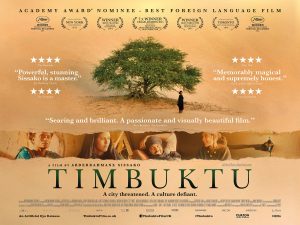‘Timbuktu’: Life interrupted – a moving study of a community reacting to jihadist rule
by festival volunteer Felicity on our Wednesday evening film – Timbuktu

In April 2012, the National Movement for the Liberation of Azawad (MNLA) and the Al Qaeda linked Ansar Dine, took over Timbuktu in the African country of Mali, and placed it under Sharia law.
Abderrahmane Sissako, the Director and co-writer of ‘Timbuktu’ was born in his mother’s country of Mauritania, but spent most of his life in Mali, his father’s place of birth. The film, released in 2014, was intended to expose the harsh rule of the Jihadists along with their hypocrisy.
The film centres on a Tuareg cattle herder and his family who reside in the dunes of Timbuktu and find their quiet lives abruptly disturbed. In the town, the jihadists enforce a strict interpretation of sharia, including passing sentences of lashes for playing football, singing and being in non-familial mixed-sex settings. The Islam of the jihadists is very much in contrast to the Islam preached by the local imam.

Throughout the film, subsidiary scenes show the reactions of Timbuktu’s residents to the jihadist rule with notable moments when local women challenging the occupiers. Although unsettling at times, the film leaves more to the imagination than showing very graphic details and is even more moving because of this. There are also moments of dark humour, acknowledging the failure of the jihadists to live up to their own rules such as hiding their smoking and, despite football being banned, being seen discussing their favourite football players.

The characters speak Arabic, French, Tamasheq, Bambara and English. Traditional ways of life are interspersed with the modern, with nomadic Tuareg in the desert communicating by mobile phones and the jihadists recording propaganda with a camera and lamp.
The cinematography is notable, with beautiful scenes of the countryside and its colourful people. ‘Timbuktu’ was selected to compete for the Palme d’Or in the main competition section at the 2014 Cannes Film Festival, where it won the Prize of the Ecumenical Jury and the François Chalais Prize. It was nominated at the Academy Awards and the BAFTAs and was named Best Film at the 11th Africa Movie Academy Awards, where it was nominated for ten further awards.
In 2017, The New York Times ranked it the twelfth best film of the twenty-first century so far. Do come and see what you think.
Event information
Event date: Wednesday 14 September
Venue: St Luke’s Charlton, SE7
Doors open: 6.45pm. Refreshments available (cash bar)
Talk: 7.00pm
Film: 7.30pm
Close: 9.30pm (film lasts 96 minutes but you are welcome to enjoy the venue for a while after the finish)
The venue: St Luke’s Charlton

Thank you to St Luke’s, Charlton for hosting the evening. Records suggest that a church dedicated to St Luke existed on the site from around 1077. It was rebuilt in 1630 with funds provided by Sir Adam Newton, of Charlton House and contains some notable 17th Century stained glass. As well as over 40 monuments to local dignitaries, including Sir Adam Newton himself, it is the final resting place of Spencer Perceval, the only British prime minister to be assassinated (1812).

The film is preceded by a short talk from Joseph Spooner about some of the points of interest of the church – well worth attending as an added highlight.
Twitter: @ChurchCharlton
Website: https://charlton.church
Facebook: https://www.facebook.com/ChurchCharlton2/ (Not used frequently though)
Sources: IMDb and Wikipedia



